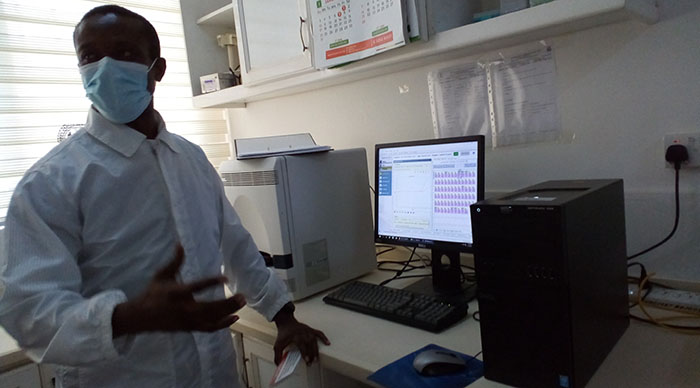Dr. Denis Adu-Gyasi conducts journalists around the PCR Machine at Kintampo Research Centre
DIRECTOR of Kintampo Health Research Centre, Dr. Kwaku Poku Asante, said every hundred Covid-19 samples brought to the facility for testing had seven positive samples.
He has passionately appealed to the public especially those in Bono and Bono East to show more concern for the pandemic.
Dr. Poku made the disclosure last Friday when a group of journalists visited the facility in Kintampo to ascertain the rate of Covid-19 infection, especially in the middle belt of the country.
He said the numbers were going up, explaining that “as at now, we have 200 samples to work on and since the Kintampo Health Research Centre was established in November 2020 to do Covid-19 testing, we have tested about 1000 samples and have recorded positive cases.”
He said the wearing of face masks, social distancing, washing of hands with running water and soap or sanitizing hands frequently would help reduce the risk of infections.
Dr. Denis Adu-Gyasi, acting Laboratory Manager, said it took about a minimum of 42 hours or 72 hours, maximum, to declare a result; saying that testing was done by two groups of six experts.
“When samples are brought, we first disinfect the arrival area including the ambulance or container in which it is brought in. Then it goes into dress up room where lab technicians who are going to work on it have to wear Personal Protective Equipment (PPE),” he said.
He added, “We then put the samples under cold conditioning before work starts on them. From here samples then go into COVID zone where the virus is inactivated and sent into biosafety cabinet and lab identity numbers such as names, where it is coming from and dates are assigned to them for easy identification (virus). Extraction is then done before it goes to molecular biology. The virus is then enriched to multiply them into the same samples as was received.”
He also said, “A chemical is then applied to make it more in the PCR machine (Polymerase Chain Reaction) – a special computer. The PCR machine can take 96 samples at the same time. What this means is that the PCR machine applies heat at different level to be able to identify which one is positive and which is negative.”
FROM Daniel Y. Dayee, Kintampo


